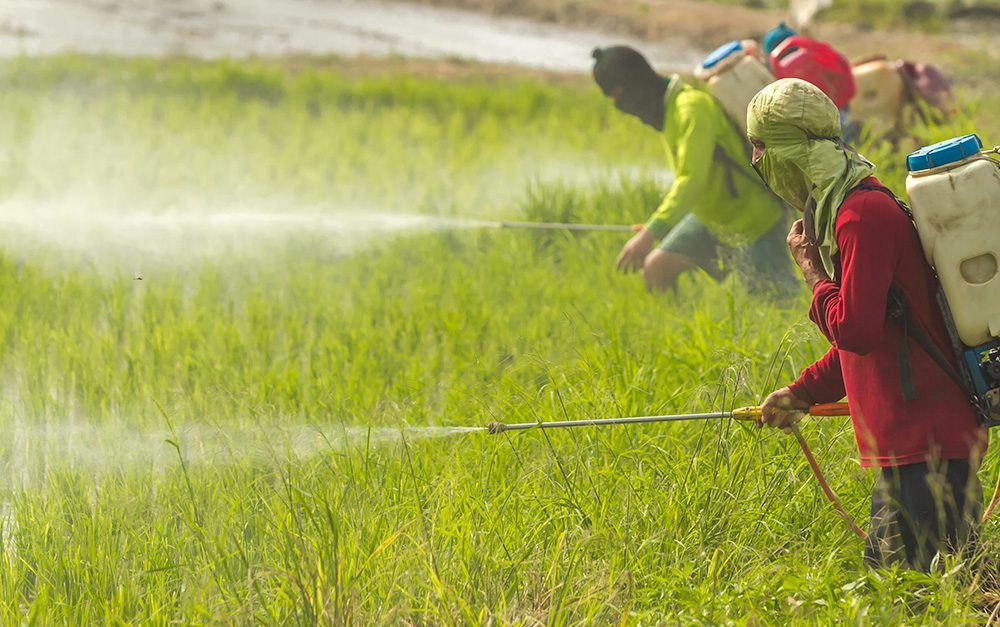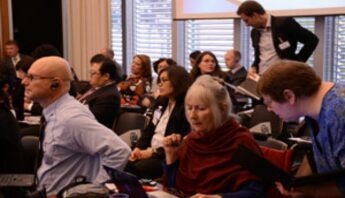PRESS RELEASE: Friday 13th October, 2023
- Global chemicals experts from around the world gathered in Rome for the Persistent Organic Pollutants Review Committee under the Stockholm Convention, where they decided that chlorpyrifos is likely, as a result of its long-range environmental transport, to lead to significant adverse human health and/or environmental effects, such that global action is warranted.
- The decision comes just a week after experts from 31 countries agreed that chlorpyrifos met the criteria to be listed under the Rotterdam Convention due to the risks it causes to human health. The Rotterdam Convention empowers the 165 countries that are Parties to the Convention to take informed decisions on future imports of the pesticide.
- Both decisions will go to the Conference of Parties in 2025
Rome, October 2023: The Pesticide Action Network International
Global experts have recommended that global action on chlorpyrifos is warranted. Global chemicals experts from around the world gathered in Rome this week where they decided that chlorpyrifos is likely, as a result of its long-range environmental transport, to lead to significant adverse human health and/or environmental effects, such that global action is Warranted.
At the Persistent Organic Pollutants Review Committee this week in Rome, experts from 31 countries and five regions of the world recommended that chlorpyrifos be moved forward to the risk management evaluation stage in Annex F of the Stockholm Convention. This decision is taken due to concerns over chlorpyrifos harms to human health and the environment and represents one step closer to listing chlorpyrifos under the Stockholm Convention, which provides a global ban on persistent organic pollutants (POPs).
Scientific data on DDT and other POPs indicate that they cause extensive contamination of the environment and living organisms. Because these chemicals are persistent in the environment, the continued use of POPs results in the sustained exposure of many species, including humans, for periods of time that span generations, resulting in both acute and chronic toxic effects. These effects can occur thousands of miles from where POPs are used, contaminating the people, wildlife, and environment of the Arctic and other remote regions.
Chlorpyrifos is an organophosphate pesticide known for its damaging effects on the human nervous system. Chlorpyrifos blocks the enzyme acetylcholinesterase that the nervous system needs to control acetylcholine, one of the many neurotransmitters mediating communication between nerve cells. Chlorpyrifos is highly toxic, with strong evidence in humans that prenatal exposure causes adverse effects on neurodevelopment. The chemical is already banned in at least 40 countries across the globe, according to the 2022 PAN Consolidated List of Bans.
Dr. Meriel Watts, who has worked on chlorpyrifos with the Pesticide Action Network for the last two decades, said ‘Finally, we have a meaningful decision from global experts in the key chemicals conventions that makes a crystal clear statement that chlorpyrifos is simply too harmful to use. It must be eliminated from agriculture now.’
Dr. Emily Marquez of PAN North America added ‘PAN has worked for many years to end the use of chlorpyrifos, a highly toxic pesticide that affects children’s brain development. Chlorpyrifos causes adverse effects on brain development at low doses. Considering what’s at stake, there is no justification for continuing its use.’
Maimouna Diene, Chairperson, PAN International: ‘It has taken too long to get to this point with an old and very harmful pesticide but we are very relieved that the UN experts have made this important decision, based on a huge amount of scientific evidence. Chlorpyrifos is still very widely used around the World. In East Africa, chlorpyrifos was used for fighting against the invasion of locusts with health exposition and contamination of the environment. We expect this important decision to signal an urgent need to move to safer and sustainable alternatives.’
*********************
PAN International; Pesticide Action Network (PAN) is a network of over 600 participating nongovernmental organizations, institutions and individuals in over 90 countries working to replace the use of hazardous pesticides with ecologically sound and socially just alternatives. PAN was founded in 1982 and has five independent, collaborating Regional Centers that implement its projects and campaigns. https://pan-international.org/
The Stockholm Convention on Persistent Organic Pollutants is a multilateral environmental agreement to protect human health and the environment from chemicals, known as Persistent Organic Pollutants (POPs) Stockholm Convention – Home page – (pops.int)
The Rotterdam Convention; formally, the Rotterdam Convention on the Prior Informed Consent Procedure for Certain Hazardous Chemicals and Pesticides in International Trade) is a multilateral environmental agreement to promote shared responsibilities in relation to the importation of hazardous chemicals. Rotterdam Convention Home Page (pic.int)
For further information please contact:
Dr Emily Marquez, Senior scientist, PANNA: emily@panna.org
Maïmouna Diene, Chair, PAN International; Director, PAN Africa: maimounadiene@pan-afrique.org
Manon Rouby, Co-coordinator, PAN International : manon@pan-uk.org







